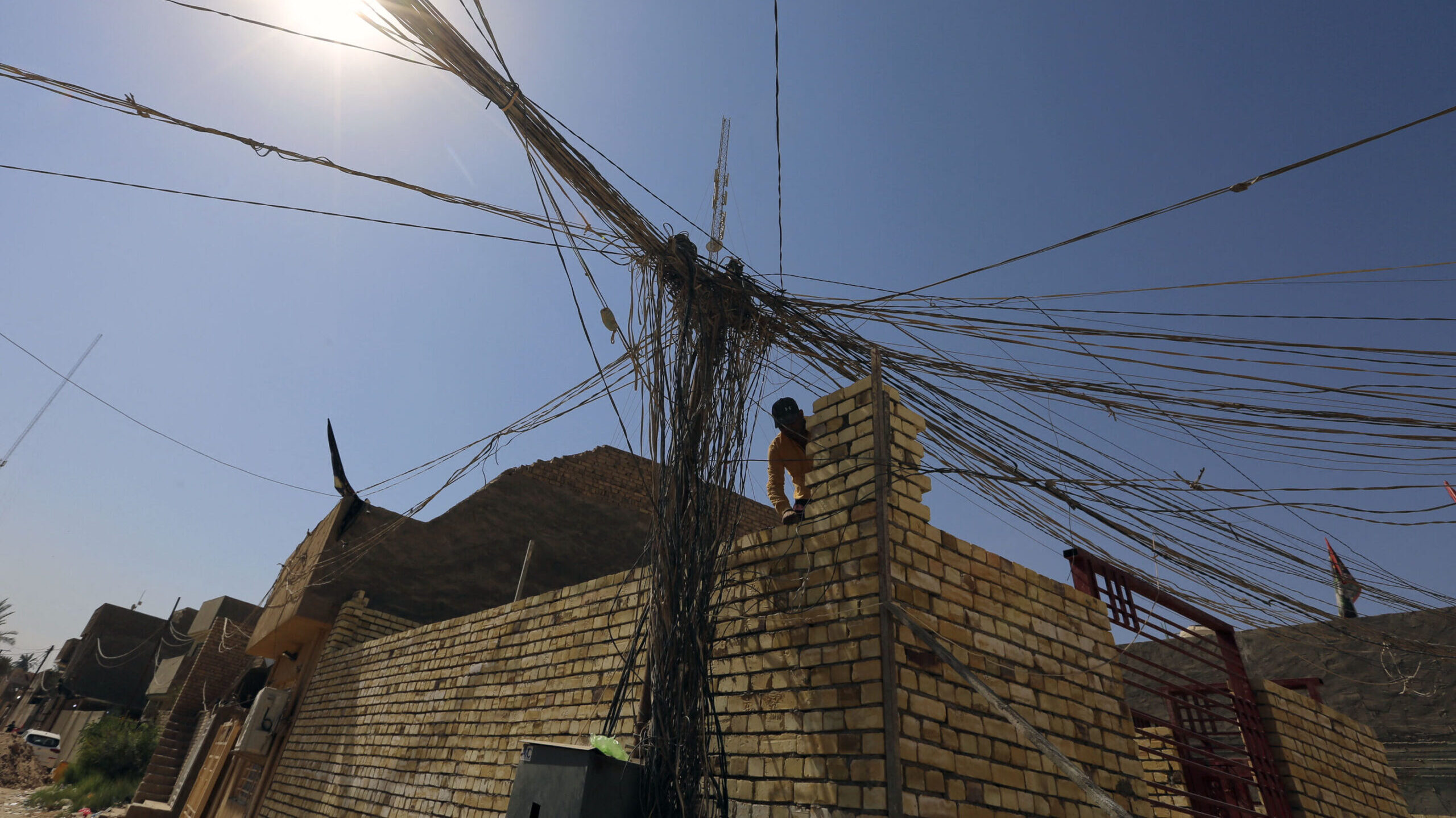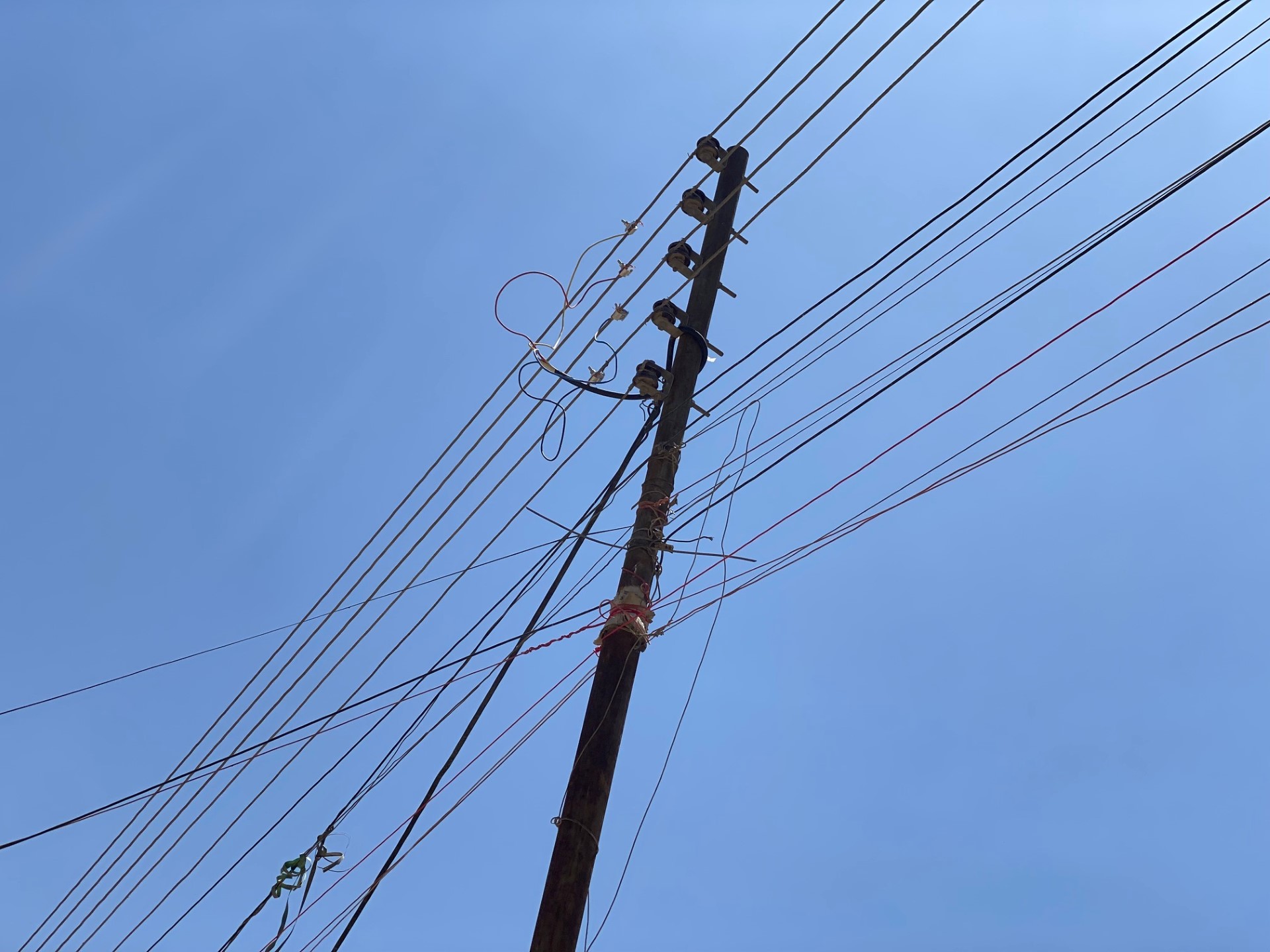The Power Struggle: Despite Billions of Dollars Spent, Iraqis Battle With Unstable Electric Supply
Since 2003, Iraqi citizens have suffered from an unreliable, intermittent government electricity supply, creating a massive industry of private generators. Hopes are now being placed on deals to buy electricity from other Arab countries.
Um Ahmed, 66, is waiting for the daily supply of government electricity before she can start her marathon of housework and turn on the air conditioners to cool the house.
“Government electricity is only available for a few hours, sometimes less than six hours a day, and it is intermittent around the clock, and sometimes it comes for less than five minutes, then it is interrupted, and so on,” she told The Media Line.
We wait for government electricity so we can turn on the air conditioners and do household chores that need electricity, such as ironing clothes, running the washing machine, or even turning on the water heaters in the winter
“We wait for government electricity so we can turn on the air conditioners and do household chores that need electricity, such as ironing clothes, running the washing machine, or even turning on the water heaters in the winter.”
Um Ahmed is one of about 41 million Iraqi citizens who have been suffering from the unstable electricity supply since 2003, when US-led coalition forces entered Iraq.
She said that her household also “rents” electricity from a private generator, but the family is only able to afford 10 amperes of electricity per month, at a cost of about 200,000 Iraqi dinars (about $150) a month.
“The 10 amperes are only sufficient to operate the refrigerator and a few basic appliances, in addition to the fan,” she said.
In a country where summer temperatures can reach 122° Fahrenheit (50° Celsius), air conditioners would seem to be a necessity. But a medium-sized air conditioner needs between eight and 12 amperes of energy.
Um Ahmed said her family recently bought a small inverter air conditioner to deal with the summer heat. Many Iraqis have begun to turn to inverter air conditioners, which save energy and do not consume more than six to seven amperes of electricity.
Out in the streets of Iraq, the electricity supply problem can be seen everywhere. Lights and air conditioners suddenly extinguish as electricity is cut off for a few minutes before the hum of private electricity generators located in all streets and intersections begins, and the appliances start up again. Wires can be seen extending from private electricity generators to homes, forming a large web over the heads of residents.

The electricity supply problem can be seen everywhere on the streets of Iraq. (Hudhaifa Ebrahim/The Media Line)
Razzaq Hussein is an Iraqi who has his own generator.
“I have had this generator for 10 years. I bought a truck engine and installed a generator on it,” Hussein told The Media Line.
Give the gift of hope
We practice what we preach:
accurate, fearless journalism. But we can't do it alone.
- On the ground in Gaza, Syria, Israel, Egypt, Pakistan, and more
- Our program trained more than 100 journalists
- Calling out fake news and reporting real facts
- On the ground in Gaza, Syria, Israel, Egypt, Pakistan, and more
- Our program trained more than 100 journalists
- Calling out fake news and reporting real facts
Join us.
Support The Media Line. Save democracy.
“The electricity generator can generate about 1,200 amperes, and I sell one ampere according to the market price, sometimes ranging between 15,000 Iraqi dinars ($11) per month, and 25,000 dinars ($19) in the summer months. Half of my monthly income goes to diesel payments, repairs, maintenance, etc. This has been my job for 10 years, after my retirement.”
Hussein also said that government electricity is not stable, and he takes turns working with his children throughout the day and night.
“I work 10 hours a day, and my children complete the rest of the 24 hours. The government electricity may be cut off at any moment, and we must operate the generator immediately after the power cut,” he said.
Unofficial estimates indicate that there are more than 4.5 million nongovernmental electric generators operating to provide energy to the population, in addition to millions of small generators in the homes of the rich. All of these generators cause significant noise pollution due to their loudness, as well as significant environmental pollution as a result of their emissions.
Since 2003, Iraq has spent billions of dollars to improve its electricity network, which had already been greatly damaged and largely repaired once before following the 1990 war in Kuwait, yet it remains dilapidated and unreliable.
In 2021, former Prime Minister Mustafa Al-Kazemi said that Iraq had spent about $81 billion on the electricity sector, “but corruption was a strong obstacle to providing energy to people in a stable manner, which is unreasonable spending without reaching a solution to the problem at its root,” according to a report by the Iraqi News Agency.
The International Energy Agency issued a report in 2019 saying that Iraq had an electricity production capacity of about 32,000 megawatts, but it was able to generate only half this amount because of its inefficient transmission network. At the same time, Iraq needed more than 40,000 megawatts of energy to secure its nonindustrial needs.
Iraqis spend more than $2 billion a month on private electricity, which is generated by private generators
“Iraqis spend more than $2 billion a month on private electricity, which is generated by private generators,” Mahmoud al-Zobaie, an official at the Iraqi Electricity Ministry, told The Media Line.
“There are more than 10 million homes, in addition to complexes, shops, factories, etc., and the real cost that Iraqis spend on electricity may be many times greater than this number, which cannot be truly estimated.”
The government has tried to privatize electricity in some parts of the capital, Baghdad, but the privatization companies were also exposed to great corruption and thefts, slowing the project down. Fewer than 10 areas of Baghdad are covered by the privatization of electricity, and the residents of those areas also still depend on private generators.
Iraq is the world’s second-largest source of gas flaring—the burning of excess natural gas during oil production—after Russia, according to official figures. Iraq burns about 17 billion cubic meters of gas annually, creating massive toxic emissions.
Baghdad has repeatedly announced efforts to reduce gas flaring, and recently signed an agreement with the US oil field services company Baker Hughes to begin exploiting the gas instead of burning it in two oil fields, Nasiriyah and Gharraf, both northwest of Basra. Beginning in Nasiriyah, the agreement aims to harness 100 million cubic feet of gas for local energy generation, enabling the generation of 400 megawatts of electricity to the Iraqi network. The project will need 30 months before it begins to benefit from extracted gas.
In February, the Gulf Electrical Interconnection Authority signed five contracts with companies implementing an electrical interconnection project between Persian Gulf countries and Iraq, at a total cost of more than $200 million. About 183 miles (295 kilometers) of electrical lines are being constructed from the Al-Wafra station in Kuwait to the Al-Faw station in southern Iraq to transfer 500 megawatts in the first phase, with a total of 1,800 megawatts planned, according to the authority’s official statement.
In the short term, the project will contribute to the Southern Iraq Electricity Network and supports the Gulf Cooperation Council’s response to the demand for electricity in the Basra Governorate. It also lays the foundations for the future exchange and trade of electrical energy between the GCC countries and Iraq, under the umbrella of an Arab market for electricity to ensure the sustainability of electric power at all times.
Al-Kazemi, the former prime minister, also signed an agreement with Egypt and Jordan for electrical interconnection to solve Iraq’s electricity crisis and to ensure energy stability in Jordan.
Egypt produces an estimated surplus of electricity of between 26,000 and 38,000 megawatts, according to a statement by the Egyptian Electricity and Renewable Energy Ministry.
It is hoped that an electrical current will be connected for the first time from Egypt to Iraq in late 2023 or early 2024, after the completion of the necessary interconnection work between Iraq and Jordan and the strengthening of the Egypt-Jordan interconnection network.
Iraq has also been buying electricity from Iran, with a capacity of 1,800 megawatts, since 2021.
However, Mahmoud Abbas, an electrical engineer and expert at the Iraqi Electricity Ministry, told The Media Line that “purchasing electricity from the Gulf states, or even Egypt and Iran, is not of great benefit.”
“Iraq’s problem is not only in the production of energy, but the network is dilapidated, very old, and in need of renewal, and it cannot deliver correct electricity to consumers,” he said.
“The problem is that the energy contracts were signed for several years, and all of them were contracts of corruption. What was spent on electricity could build a complete and integrated electricity network four times over, but all of them were fake contracts. There were supposed to be contracts with giant companies such as General Electric and Siemens, which are specialized companies, in addition to several Chinese and Turkish companies, but these contracts were passed with a budget, and we did not see them on the ground.”




